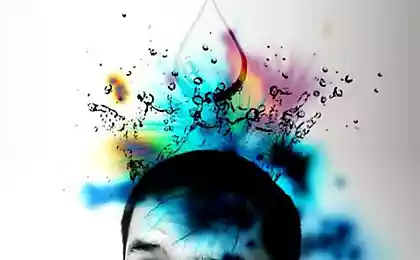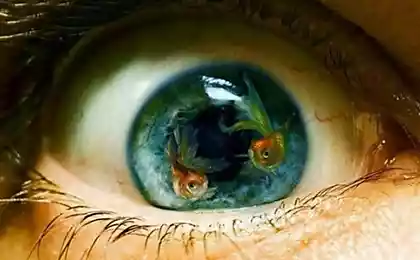501
Casual casual: the idea that it is difficult for many to accept
Site publishes an article by Paul Zygmantovich family psychologist, explains why we are so difficult to deal with the accident. Many people think that all around us acts an invisible force that of some of their reasons all links into a single complex network. Simply put, people believe that accidents are not accidental, everything is interconnected and if today I forgot the umbrella at home, be sure to go rain.

To put it mildly, this is not true. These conclusions stem from the biological human tendency to establish relationships.
This tendency is very useful at a particular level (when helping us to understand that there is a green fruit is harmful to the stomach), but often gives failures, as we try to comprehend abstract concepts such as economics, politics, or even the life of the common man.
Here's a simple example - a textbook study. In 1965, William Ward and Herbert Jenkins defenseless people gathered and told them that those selected for the evaluation of the results of one experiment (fictional, of course).
The essence of the experiment was such fictional - 50 days in one of the regions of the US were treated with special reagents clouds to make it rain. The subjects (present) proposed to assess the effectiveness of the experiment with the clouds (fictional).
Information on the processing of the clouds and the rain was walking was invented, like the rest of the experiment, there was no causal link between the two. Scientists simply randomly selected days, when the cloud allegedly treated, and the days when supposedly there was a rain. Moreover, the selection process was the most "osluchaen" to make the selection of truly random.
Do you think that helped? Certainly not! Subjects with great pleasure that found a link between the treatment of clouds and rain (invented, please remember!)
In psychological science are fictitious connection called illusory relationship or illusory correlations.
People love to notice illusory correlation wherever reach. On this subject it has been a lot of research, and they argue - if a person is convinced of the existence of a correlation (relationship), he will find it. Though by hook or by crook though, but - find
Here's another example.
Edinburgh linguists led by Simon Kirby put an elegant experiment (Kirby et al. 2008). Legend was such - subjects were asked to learn an alien language
. Participants were shown circles, squares and triangles in red, blue and black colors. These figures were moving along different trajectories, spinning, stopped and so on. In addition to the figures shown more words that aliens supposedly called the figure and type of movement.
The subjects worked in "chains" of ten people. Each subsequent received the results of the previous (and very first got the computer randomly synthesized speech and image). In total there were four such chains.
What is the result? Yes, the same. The random coincidences people to see patterns and each (each!) "Chain" of ten people were his "inoplanetyanskie" languages.
< In other words, people to see order where there was only chaos. < /
Such is the inevitable human characteristic. It is important to know - we see particularly good relationship where they expect to see
. For example, you believe that you buy oranges at the store is the falling dollar. In this case, itself runs the cognitive mechanism of selection - you will notice and remember only those cases buying oranges, which coincided with the fall of the dollar. Just emphasize that these cases.
So it is with prophetic dreams. People remember only the dreams that coincided with reality. But if we look at the whole statistics, you would see that the "dreams come true" - the clearest example of the illusory correlation. During his life, a person sees a few dreams of millions and at least five of them and the match with reality. It's just inevitable.
Same with forebodings. Each of us had ten thousand premonitions that did not materialize. But remember we are the only ones that come true.
Same with many of the beloved "synchrony" - when we think of the loved ones and friends call us, for example. In these cases, we notice and remember only those are cases where our thoughts coincided with a call to a loved one and lose sight of all the darkness when the thought of not accompanied by his close call.
Thus, chance often accidental. "Deliberate accidents" are the most likely just a coincidence that we are under the influence of our desire to see all the ordering, take for related events.
This is not fatal and not bad. It is our innate propensity, which is often useful. We only need to understand that in some cases the tendency to illusory relationships is useless and even harmful. And before you believe in the correlation, it is necessary to check - whether it illusory
. via zygmantovich.com/?page_id=10322

To put it mildly, this is not true. These conclusions stem from the biological human tendency to establish relationships.
This tendency is very useful at a particular level (when helping us to understand that there is a green fruit is harmful to the stomach), but often gives failures, as we try to comprehend abstract concepts such as economics, politics, or even the life of the common man.
Here's a simple example - a textbook study. In 1965, William Ward and Herbert Jenkins defenseless people gathered and told them that those selected for the evaluation of the results of one experiment (fictional, of course).
The essence of the experiment was such fictional - 50 days in one of the regions of the US were treated with special reagents clouds to make it rain. The subjects (present) proposed to assess the effectiveness of the experiment with the clouds (fictional).
Information on the processing of the clouds and the rain was walking was invented, like the rest of the experiment, there was no causal link between the two. Scientists simply randomly selected days, when the cloud allegedly treated, and the days when supposedly there was a rain. Moreover, the selection process was the most "osluchaen" to make the selection of truly random.
Do you think that helped? Certainly not! Subjects with great pleasure that found a link between the treatment of clouds and rain (invented, please remember!)
In psychological science are fictitious connection called illusory relationship or illusory correlations.
People love to notice illusory correlation wherever reach. On this subject it has been a lot of research, and they argue - if a person is convinced of the existence of a correlation (relationship), he will find it. Though by hook or by crook though, but - find
Here's another example.
Edinburgh linguists led by Simon Kirby put an elegant experiment (Kirby et al. 2008). Legend was such - subjects were asked to learn an alien language
. Participants were shown circles, squares and triangles in red, blue and black colors. These figures were moving along different trajectories, spinning, stopped and so on. In addition to the figures shown more words that aliens supposedly called the figure and type of movement.
The subjects worked in "chains" of ten people. Each subsequent received the results of the previous (and very first got the computer randomly synthesized speech and image). In total there were four such chains.
What is the result? Yes, the same. The random coincidences people to see patterns and each (each!) "Chain" of ten people were his "inoplanetyanskie" languages.
< In other words, people to see order where there was only chaos. < /
Such is the inevitable human characteristic. It is important to know - we see particularly good relationship where they expect to see
. For example, you believe that you buy oranges at the store is the falling dollar. In this case, itself runs the cognitive mechanism of selection - you will notice and remember only those cases buying oranges, which coincided with the fall of the dollar. Just emphasize that these cases.
So it is with prophetic dreams. People remember only the dreams that coincided with reality. But if we look at the whole statistics, you would see that the "dreams come true" - the clearest example of the illusory correlation. During his life, a person sees a few dreams of millions and at least five of them and the match with reality. It's just inevitable.
Same with forebodings. Each of us had ten thousand premonitions that did not materialize. But remember we are the only ones that come true.
Same with many of the beloved "synchrony" - when we think of the loved ones and friends call us, for example. In these cases, we notice and remember only those are cases where our thoughts coincided with a call to a loved one and lose sight of all the darkness when the thought of not accompanied by his close call.
Thus, chance often accidental. "Deliberate accidents" are the most likely just a coincidence that we are under the influence of our desire to see all the ordering, take for related events.
This is not fatal and not bad. It is our innate propensity, which is often useful. We only need to understand that in some cases the tendency to illusory relationships is useless and even harmful. And before you believe in the correlation, it is necessary to check - whether it illusory
. via zygmantovich.com/?page_id=10322
Like your favorite emoticons look on smartphones from other brands
20 slaughter comments from social networks, which have amused























